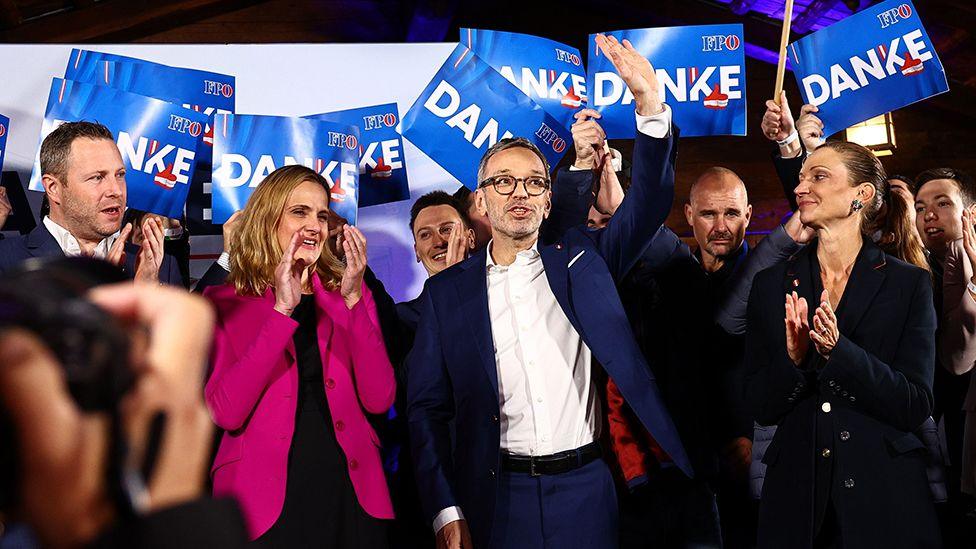Austria’s Far-Right Freedom Party Celebrates Historic Election Win
4 min read
Austria’s far-right Freedom Party (FPÖ) has heralded a new era following its significant election victory, according to party leader Herbert Kickl. With provisional results showing the FPÖ securing 29.1% of the vote—almost three points ahead of the conservative People’s Party (ÖVP) at 26.4%—the party is positioned as a dominant force, albeit without a clear majority.
Kickl expressed gratitude to voters for their “optimism, courage, and trust,” claiming this moment is a “piece of history.” His victory aligns with a broader trend of far-right successes across Europe, indicating a shifting political landscape.
Despite the FPÖ’s strong showing, coalition-building may prove challenging. The ÖVP, currently led by Chancellor Karl Nehammer, has refused to participate in any government led by Kickl, labeling it “impossible” to collaborate with someone he describes as a promoter of conspiracy theories. The high voter turnout of 74.9% reflects the election’s focus on critical issues such as migration, asylum, the struggling economy, and the war in Ukraine.
As the FPÖ celebrated its gains, the party’s general secretary, Michael Schnedlitz, noted that “the men and women of Austria have made history today.” However, he remained non-committal about potential coalition arrangements. Preliminary analyses indicate that voters aged 35-59, along with a slightly higher percentage of women than men, largely supported the far-right party. The FPÖ is projected to hold 56 seats in the 183-seat parliament, compared to the ÖVP’s 52 and the Social Democrats’ 41.
Kickl has promised to establish a “Fortress Austria,” pledging to restore security, prosperity, and peace. The party advocates for strict immigration policies, including proposals for “remigration,” which would involve sending asylum seekers back to their countries of origin. Additionally, the FPÖ aims to impose restrictions on asylum rights as a pathway to citizenship.
Kickl’s political stance resonates with the approach of Hungarian Prime Minister Viktor Orban and his concept of “illiberal democracy.” Social Democrat leader Andreas Babler cautioned against Austria following Hungary’s path, highlighting the risks associated with such governance.
The FPÖ’s controversial history is notable; it was founded by former Nazis in the 1950s. In a troubling incident just days before the election, some FPÖ candidates were filmed at a funeral where an SS song was performed, further igniting concerns about the party’s ideological roots. As the election results became apparent, a small group of protesters gathered outside the parliament, brandishing anti-Nazi banners that read, “Nazis, get out of parliament,” and “Don’t let Nazis govern.”
Kickl’s path to forming a coalition is fraught with difficulty, given his polarizing reputation. The Social Democrats, Greens, and Neos have all categorically ruled out collaboration with the FPÖ. The only viable coalition could involve the ÖVP, but Kickl must navigate the party’s reluctance to accept him as chancellor.
Political analyst Thomas Hofer noted that it remains uncertain whether Austrian President Alexander Van der Bellen would grant Kickl a mandate to form a government. If the ÖVP chooses to pursue a coalition with the Social Democrats, it may also seek alliances with the liberal Neos or the Greens.
Nehammer could face internal pressure within the ÖVP to reconsider his stance against Kickl. After such a historic electoral defeat, some have suggested that Nehammer should resign, although this was dismissed by the party’s general secretary. President Van der Bellen has previously expressed reservations about the FPÖ due to its critical stance toward the EU and its hesitance to condemn Russia’s invasion of Ukraine. The party opposes EU sanctions, citing Austria’s policy of neutrality.
Reactions among Austrians to the election results have been mixed. Nikolai Selikovsky, a Vienna resident, expressed sadness that so many people were gravitating towards radical right-wing ideas, lamenting the failure of other parties to engage constructively. Conversely, Josef Binder, a carpenter who voted for the FPÖ, argued that it is undemocratic for other parties to dismiss 29% of the electorate.
Concerns over the FPÖ’s remigration policy were voiced by individuals such as Berat Oeztoprak, a young kebab seller, who fears that his status could be threatened despite his contributions to Austrian society.
Kickl’s electoral victory follows a trend of rising far-right parties across Europe, including Italy’s Giorgia Meloni and Germany’s AfD. While Meloni supports the EU’s defense of Ukraine, Kickl has tapped into anti-immigration sentiments and dissatisfaction with the government’s pandemic response.
The FPÖ’s recent success marks a significant recovery from 2019, when they faltered following a scandal that tarnished their former leadership. As Austria navigates its political future, the ramifications of this election will likely resonate across the continent.






